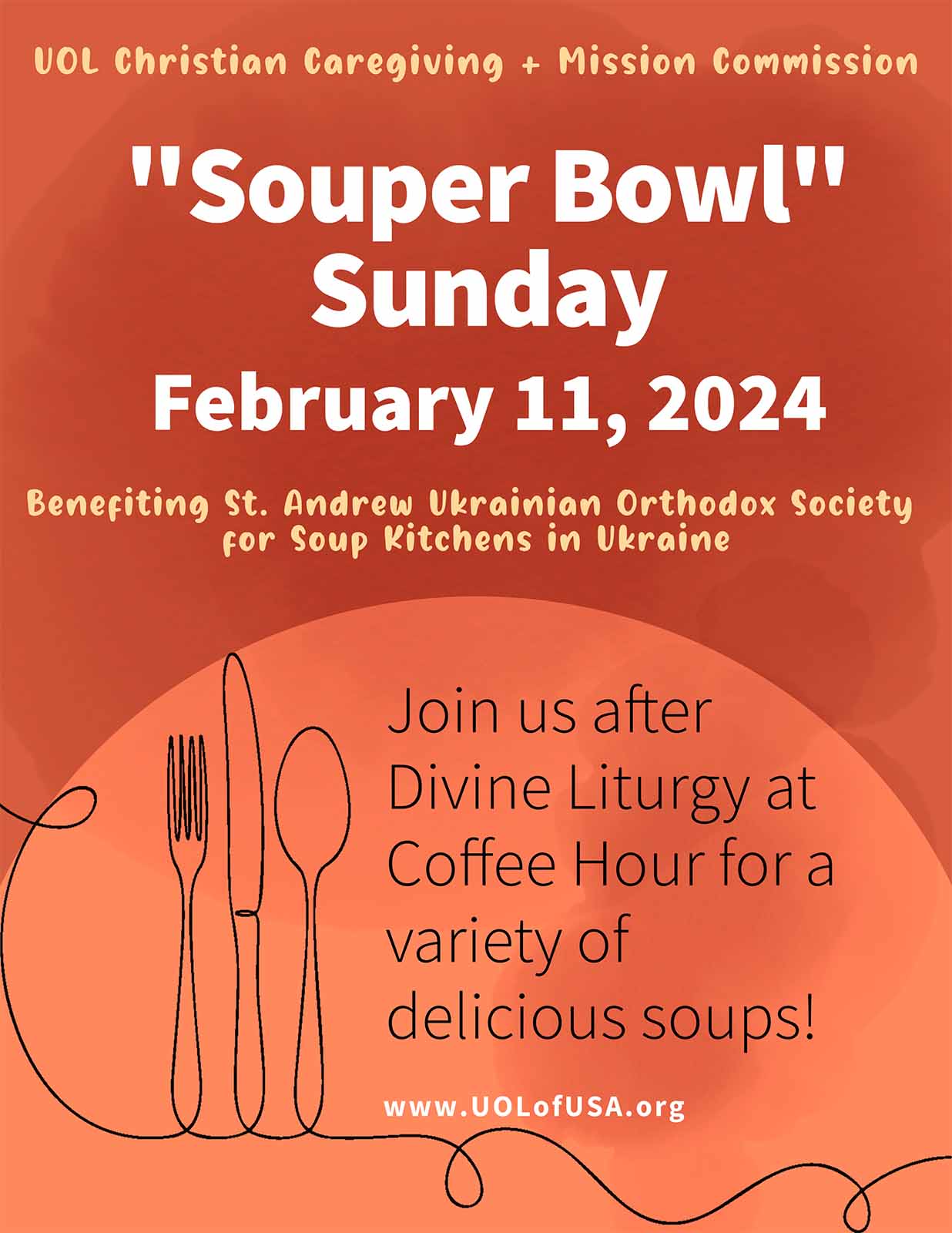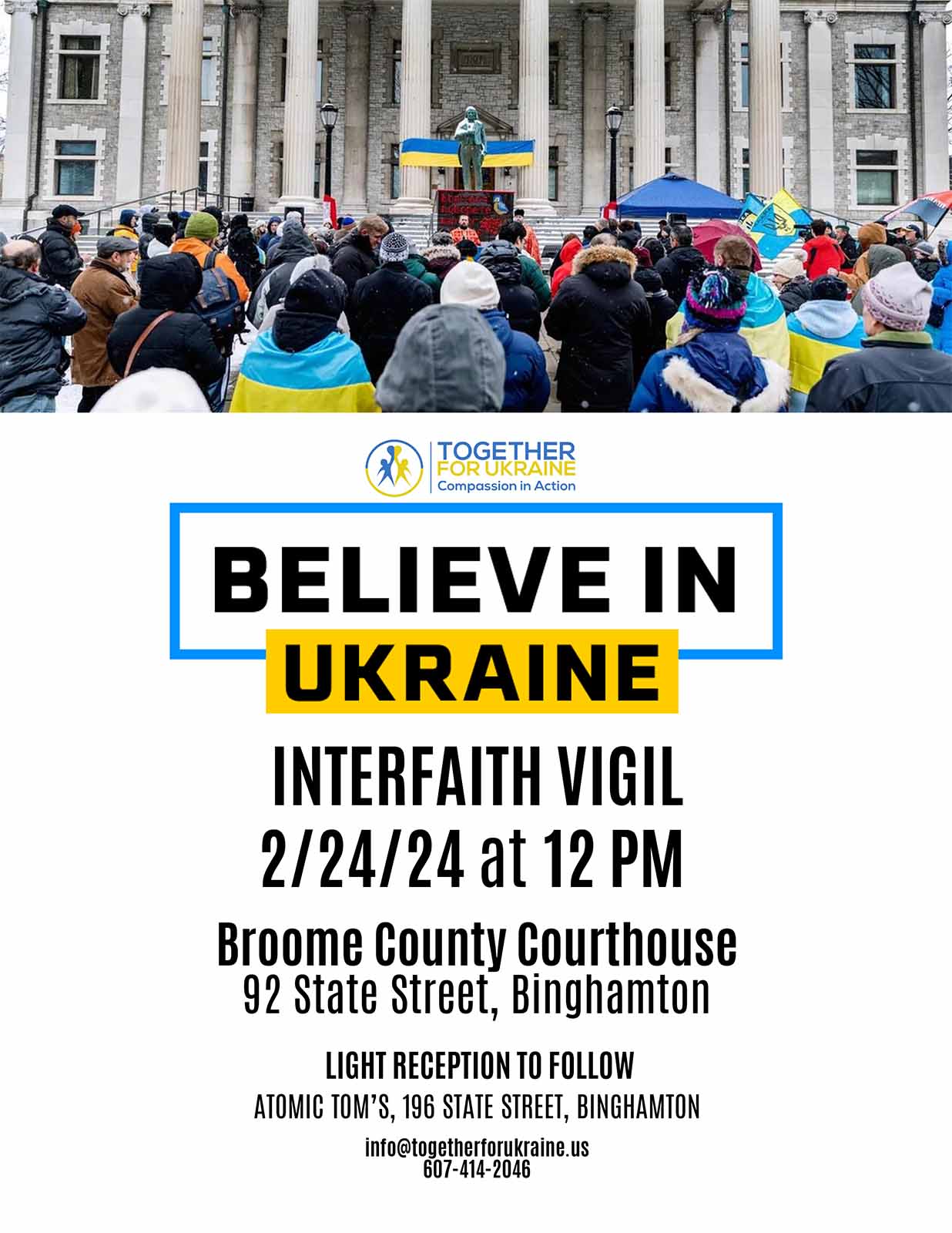Bulletin for February 11, 2024
Feb. 11 – 36 Sunday after Pentecost. Tone 3
Translation of the relics of Hieromartyr Ignatius the God-bearer(107). Martyrs Romanus, James, Philotheus, Hyperechius, Abibus, Julian and Paregorius (297) Martyrs Silvanus, bishop of Emesa, Luke the Deacon, and Mocius (Mucius) the Reader (312). St. Laurence, recluse of the Kyiv Caves and bishop of Turov (1194).
2 Cor. 6:16–7:1; Мt. 15:21-28;
Heb. 4:14 -5:6; Mk. 9:33-41
Feb. 15 – THE MEETING OF OUR LORD, GOD AND SAVIOR JESUS CHRIST.
СТРІТЕННЯ ГОСПОДА БОГА І СПАСА НАШОГО ІСУСА ХРИСТА.
Heb. 7:7-17; Lk. 2:22-40
Feb. 18 – 37 Sunday after Pentecost. Tone 4
Holy Martyr Agatha (251). Martyr Theodoula, and Martyrs Helladius, Macarius, Boethos, and Evagrius (304). St. Theodosius, archbishop of Chernihiv (1696).
1 Тim. 4:9-15; Lk. 19:1-10;
Services & Other Events
YouTube Livestreaming services can be found on YouTube TV search for Ivan Synevskyy
11 February, Sunday:
- 9am – Confession / Hours
- 9:30am – Divine Liturgy - Бож. Літургія
- St. John's Ukrainian Refugee and Humanitarian Assistance Committee Meeting in the Memorial Center following Divine Liturgy.
14 February, Wednesday:
- 6:30pm – Great Vespers - Вел. Вечірня
15 February, Meeting of the Lord - Стрітення:
- 9am – Divine Liturgy - Бож. Літургія
- 6pm – Church Restoration Com. Meeting
- 7pm – Finance Committee Meeting
17 February, Saturday:
- 10am-12pm – Holubtsi/Pirohy Sale
- 5pm – Great Vespers - Вел. Вечірня
18 February, Sunday:
- 9am – Confession / Hours
- 9:30am – Divine Liturgy - Бож. Літургія
19 February, Monday:
- 8am – Kolachky
- 7pm – Parish Council Meeting
Fr. Ivan can be reached by call/text c.617-646-9515 or email: fr.i.synevskyy@uocofusa.org
Апостол
З Другого Посла́ння до Коринтя́н Свято́го Апо́стола Павла́ чита́ння (6:16–7:1)
Браття, яка сумісність храму Божого з ідолами? Бо ви храм Бога живого, як сказав Бог: оселюся в них і буду ходити в них, і буду їхнім Богом, і вони будуть Моїм народом. І тому вийдіть з середовища їхнього і відділіться, говорить Господь, і не доторкайтесь до нечистого; і Я прийму вас. І буду вам Отцем, і ви будете Моїми синами і дочками, говорить Господь Вседержитель. Отже, улюблені, маючи такі обітниці, очистимо себе від усякої скверни плоті і духу, здійснюючи святиню в страсі Божому.
До Євреїв 4:14-5:6
Браття, отже, маючи Первосвященника Великого, Котрий пройшов небеса, Ісуса Сина Божого, будемо твердо триматися сповідування нашого. Бо ми маємо не такого первосвященника, який не може співстраждати нам в немочах наших, але Такого, Який, подібно до нас, зазнав спокуси у всьому, крім гріха. Тому з дерзновінням приступаймо до престолу благодаті, щоб одержати милість і знайти благодать для своєчасної допомоги. Бо кожний первосвященник, котрий з людей обирається, для людей поставляється на служіння Богові, щоб приносити дари й жертви за гріхи, який може бути поблажливим до неуків та заблудливих, тому що й сам обкладений неміччю, і тому він повинен як за народ, так і за себе приносити жертви за гріхи. І ніхто сам собою не приймає цієї честі, але покликаний Богом, як і Аарон. Так і Христос не Сам Собі присвоїв славу бути первосвященником, але Той, Хто сказав Йому: Ти Син Мій, Я нині родив Тебе; як і в іншому місці говорить: Ти – священник повік за чином Мелхіседека.
Євангеліє
Від Матвія 15:21-28
І, вийшовши звідти, Ісус пішов у краї Тирські і Сидонські. І ось, жінка хананеянка, вийшовши з тих місць, кричала Йому: помилуй мене, Господи, сину Давидів, дочка моя тяжко біснується. Але Він не відповідав їй ні слова. І підійшли до Нього учні Його і благали: відпусти її, бо кричить услід за нами. Він же сказав у відповідь: Я посланий лише до загиблих овець дому Ізраїлевого. А вона, підійшовши, поклонилася Йому і каже: Господи! допоможи мені. Він же сказав у відповідь: недобре взяти хліб у дітей і кинути псам. Вона сказала: так, Господи! але і пси їдять крихти, що падають зі столу господарів їхніх. Тоді Ісус сказав їй у відповідь: о, жінко! велика віра твоя; хай буде тобі, як ти хочеш. І одужала дочка її у той же час.
Від Марка 9:33-41
Ісус прийшов до Капернаума; і коли був у домі, запитав їх: про що дорогою ви міркували між собою? Вони мовчали; бо дорогою міркували між собою, хто більший. І, сівши, покликав дванадцятьох і сказав їм: хто хоче бути першим, хай буде з усіх останнім і всім слугою. І, взявши дитя, поставив його посеред них і, обнявши його, сказав їм: хто прийме в ім'я Моє одного з таких дітей, той Мене приймає; а хто Мене прийме, той не Мене приймає, а Того, Хто послав Мене. При цьому Іоанн сказав: Учителю! ми бачили чоловіка, який Твоїм іменем виганяє бісів, а не ходить за нами; і заборонили йому, бо не ходить за нами. Ісус сказав: не забороняйте йому, бо ніхто, сотворивши чудо іменем Моїм, не може скоро злословити Мене. Бо хто не проти вас, той за вас. І хто напоїть вас чашею води в ім'я Моє, тому що ви Христові, істинно кажу вам, не втратить своєї нагороди.
Hieromartyr Ignatius the God-bearer
St. Ignatius the God-bearer is of particular importance to us, for he was close to the Apostles, heard the teachings of Christianity from them directly, and was an eyewitness to the spread and development of the first Christian communities. In his seven Epistles, he provided us with an impression of the Apostolic era.
St. Ignatius was born in Syria, toward the end of the Savior's earthly life. We learn from the account of St. Ignatius' life that he had been that youth whom the Lord took into his arms and said "Except ye be converted, and become as little children, ye shall not enter into the Kingdom of Heaven." (Matthew 18:3) He is known as «God-bearer» because, with his profound love for the Lord, it was as if he was carrying Him in his heart. St. Ignatius was a disciple of the Holy Apostle and Evangelist John the Theologian. From St. Ignatius' Epistle to the Smyrnians, it is evident that he was particularly close to the Holy Apostle Peter, accompanying him on a number of his apostolic journeys. Shortly before the destruction of Jerusalem in the year 72 AD, Evod, one of the 70 Apostles of Christ, reposed, and Ignatius took his place as bishop of Antioch, the capital city of Syria.
St. Ignatius administered the Church of Antioch for 40 years (67-107 AD). In a vision, he was made worthy to witness Divine Services in Heaven, and to hear Angelic chant. Following the example he had witnessed in the Angelic world, he introduced into the Divine Services antiphonal chant, in which two choirs sing in turn, as if calling to one another. From Syria, this type of chant quickly spread throughout the early Church.
In the year 107, during a campaign against the Armenians, Emperor Trajan was passing through Antioch. He was told that Holy Hierarch St. Ignatius was of the Christian confession, that he taught disdain for wealth, observance of celibacy, and not offering sacrifice to the Roman gods. The Emperor summoned the Holy Hierarch and demanded that he cease to preach about Christ. When the Elder refused, he was sent in shackles to Rome, where he was sent to the Coliseum to be torn apart by wild beasts for the amusement of the crowd. On the way to Rome, he wrote the seven Epistles that have survived to our days. In his Epistle [to the Romans], St. Ignatius asks Christians not to try to save him from death. «I entreat you, do not unseasonably befriend me. Suffer me to belong to the wild beasts, through whom I may attain unto God. I am God's grain, and I am ground by the teeth of wild beasts, that I may be found pure bread.» Upon hearing of the Holy Hierarch's courage, Trajan put an end to persecuting Christians. St. Ignatius' relics were translated to Antioch, but later were returned to Rome and placed in the Church of Hieromartyr St. Clement, Pope of Rome.
In his Epistle to the Ephesians, St. Ignatius writes, "...they who profess to be Christ's shall be apparent by their deeds...." He states, «...hold fast perfectly your faith and love in Jesus Christ, for these are the beginning and the end of life. The beginning is faith, the end is love. And the two blending in unity are God, and all else follows on these, ending in perfect goodness. No man who professes faith lives in sin, nor if he possesses love, does he live in hatred.»
Translation of the relics of the Hieromartyr Ignatius, the Godbearer and Bishop of Antioch
The Transfer of the Relics of the Hieromartyr Ignatius the God-Bearer: (See December 20). After the holy hieromartyr Ignatius was thrown to the lions in the year 107 on the orders of the emperor Trajan, Christians gathered up his bones and preserved them at Rome.
Later, in the year 108, the saint's relics were collected and buried outside the gate of Daphne at Antioch. A second transfer, to the city of Antioch itself, took place in the year 438. After the capture of Antioch by the Persians, the relics of the Hieromartyr Ignatius were returned to Rome and placed into the church of the holy Hieromartyr Clement in the year 540 (in 637, according to other sources).
Saint Ignatius introduced antiphonal singing into Church services. He has left us seven archpastoral epistles in which he provided instructions on faith, love and good works. He also urged his flock to preserve the unity of the faith and to beware of heretics. He encouraged people to honor and obey their bishops, "We should regard the bishop as we would the Lord Himself." (To the Ephesians 6)
In his Letter to Polycarp, Saint Ignatius writes: "Listen to the bishop, if you want God to listen to you... let your baptism be your shield, your faith a helmet, your charity a spear, your patience, like full armor." (Compare Eph. 6:14-17 and the Wisdom of Solomon 5:17-20. Also The Ladder 4:2)
Our father among the saints Ignatius the God-bearer of Antioch (probably died AD 107) was the third bishop of Antioch, after the Apostle Peter and Euodios, whom Ignatius succeeded around AD 68. Ignatius, who also called himself Theophorus ("God-bearer"), was most likely a disciple of both Apostles Peter and John. Several of his letters have survived to this day; he is one of the Apostolic Fathers (the earliest group of the Church Fathers), and a saint in the Orthodox Church (feastday, December 20).
He was arrested by the Roman authorities and transported to Rome to die in the arena. They hoped to make an example of him and thus discourage Christianity from spreading. Instead, he met with and encouraged Christians all along his route, and wrote letters to the Ephesians, Magnesians, Trallians, Philadelphians, Smyrneans, and Romans, as well as a letter to Polycarp, who was bishop of Smyrna and a disciple of John the Evangelist.
These letters proved to be influential in the development of Christian theology, since the number of extant writings from this period of Church history is very small. They bear signs of being written in great haste and without a proper plan, such as run-on sentences and an unsystematic succesion of thought. Ignatius is the first known Christian writer to put great stress on loyality to a single bishop in each city, who is assisted by both presbyters (priests) and deacons. Earlier writings only mention either bishops or presbyters, and give the impression that there was usually more than one bishop per congregation. Ignatius also stresses the value of the Eucharist, calling it "a medicine to immortality." The very strong desire for bloody martyrdom in the arena, which Ignatius expresses rather graphically in places, may seem quite odd to the modern reader, but an examination of his theology of soteriology shows that he regarded salvation as being from the power and fear of death. So, for him, to try to escape his martyrdom would be to fear death and place himself back under its power.
Nowadays only shorter variants of those seven letters are thought to be authentic writings of Ignatius. Their longer variants are thought to be emendations from the fifth century, created to postumously enlist Ignatius as an unwitting witness into certain theological fights of that age, while the other letters bearing his name and the purported eye-witness account of his martyrdom, are thought to be pure forgeries from around the same time.
Quote
"As a pilot calls on winds and a storm-tossed mariner looks homeward, so the times call on you to win your way to God. As God's athlete, be sober; the stake is immortality and eternal life."
Священномученик Ігнатій Богоносець
Святий Ігнатій Богоносець має особливе значення для нас, бо він близько спілкувався з апостолами, безпосередньо від них чув християнське вчення і був свідком розповсюдження та розвитку перших християнських громад. У своїх семи листах він закарбував для нас апостольську епоху.
Святий Ігнатій народився в Сирії в останні роки життя Спасителя. Його життєпис оповідає, що він був тим отроком, якого Господь взяв на руки і сказав: "Якщо не навернетеся і не будете як діти, не ввійдете в Царство Небесне" (Мф. 18:3). Богоносцем його названо тому, що, міцно люблячи Господа, він нібито носив Його у своєму серці. Він був учнем апостола і євангеліста Іоанна Богослова. З послання святого Ігнатія до смирнян видно, що він був особливо близький до апостола Петра і супроводжував його в деяких його апостольських подорожах. Незадовго до руйнування Єрусалима 72 року, помер Евод, один із сімдесяти учнів Христових, і його наступником на Антіохійській кафедрі (у столиці Сирії) став Ігнатій.
Святий Ігнатій керував Антіохійською церквою протягом 40 років (67-107 рр..). В особливому видінні він удостоївся побачити небесне богослужіння і почути Ангельський спів. За зразком Ангельського світу він запровадив на богослужіннях антифонний спів, у якому два хори чергуються і ніби перегукуються. Цей спів із Сирії швидко поширився в ранній Церкві.
У 107 році під час походу проти вірмен імператор Траян проходив через Антіохію. Йому доповіли, що святитель Ігнатій сповідує Христа, вчить зневажати багатство, зберігати дівоцтво і не приносити жертву римським богам. Імператор викликав святителя і зажадав, щоб він припинив свою проповідь про Христа. Старець відмовився. Тоді його в кайданах відправили в Рим, де на потіху народу його віддали на розтерзання звірам у Колізеї. Дорогою до Риму він написав сім послань, які збереглися до наших днів. У своїх посланнях святий Ігнатій просить християн не намагатися врятувати його від смерті: "Благаю вас, не виявляйте мені необережної любові. Залиште мене бути їжею звірів, щоб за допомогою їх досягти Бога. Я – пшениця Божа. Нехай перемелють мене зуби звірів, нехай стану чистим хлібом Христовим". Почувши про мужність святителя, Траян припинив гоніння на християн. Мощі його було перенесено до Антіохії, а згодом повернуто до Риму і покладено в церкві в ім'я священномученика Климента, папи Римського.
У своєму посланні до Єфесян святий Ігнатій писав: "Зберігайте віру і любов і на ділі показуйте себе християнами. Віра і любов суть початок і кінець життя. Віра – початок, а любов – кінець, обидві ж у з'єднанні суть справа Божа. Все інше, що належить до чеснот, від них походить. Ніхто, хто сповідує віру, не грішить, і ніхто, хто здобув любов, не ненавидить".
With Appreciation
We extend our appreciation to all who helped during Holubtsi and Kolachky Work Sessions this past week. Your work and support is much appreciated! God bless you all!
Blessing of Homes
The Blessing of Homes with Theophany Holy Water will be done until Feb. 14. Please contact Fr. Ivan to schedule yours.
Kitchen Sessions
Monday, 2/19 8am Kolachky
Saturday, 2/24 8am Bread
Saturday, 3/2 8am Rolls
Friday 3/8 7:30am Potatoes; 10am - 12noon Make pirohy balls
Saturday, 3/9 7:30am set-up; 8am - 12noon Pinching, Lunch after
Thursday, 3/14 8:30am Holubtsi
Saturday, 3/23 Easter Bake Sale (Hip-Hip-Hooray)
UOL Christian Caregiving - "Souper Bowl" Sunday - February 11, 2024


Let's Help Ukraine!
St. John's Ukrainian Humanitarian Fund is accepting donations to help Ukrainians during war. Donations will go to provide food and other humanitarian needs.
To make donation online click here
We accept checks as well.
Please make the checks to St. John Ukrainian Humanitarian Fund
Mailing address:
1 Saint John's Parkway
Johnson City NY 13790
Cash is accepted in church
Pray for Ukraine!
Prayers for Ukraine are done during each service. To see the schedule click here.
Молитви за Україну проводяться під час кожної служби. За розкладом дивіться тут.
May God bless and protect Ukraine!
Happy Birthday
- February 13: Yuliia Astakhova
- February 13: Renata Czebiniak
* If your or someone else's birthday is missing or incorrect please let Fr. Ivan know right away.
Please Pray for the Servants of God
Rose, Marlyn, Bob, Nadine,
John, Olga, Jane, Zenna, Douglas,
Melanie, Helen, William, Marion,
Mariann, Jean, Brian, Pipinos,
Fr. James, Scott, Andriy,
Nicholas, James, Quinn Marie,
Upcoming Readings
Mon. Feb. 12 – Heb. 13:7-16; Mt. 5:14-19
Tue. Feb. 13 – Jas. 3:1-10; Mk. 11:11-23;
Wed. Feb. 14 – Jas. 3:11-4:6; Mk. 11:23-26;
Thu. Feb. 15 – Heb. 7:7-17; Lk. 2:22-40
Fri. Feb. 16 – 1 Pet. 1:1-2, 10-12, 2:6-10; Mk. 12:1-12;
Sat. Feb. 17 – 1 Thess. 5:14-23; Lk. 17:3-10;
Contact Information
1 St. John's Parkway,
Johnson City, New York 13790
www.stjohnuoc.org
Priest: Fr. Ivan Synevskyy
Ph: (617) 646-9515
Priest's E-mail: fr.i.synevskyy@uocofusa.org
Parish Council President – Brian Baxendale
Ph.: (607) 205 - 2436
President's E-mail: bbaxendale@stny.rr.com
Vice President – Gary Dobransky
Ph.: (607) 797-2529
E-mail: dobranskygarye@gmail.com



